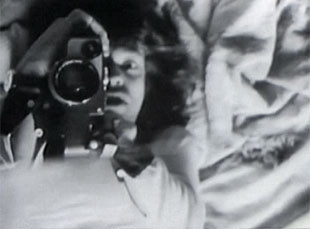ROBERT FRANK: PART I. EIKO GRIMBERG: THEMATIC RECORDS.

Filmstill from Cocksucker Blues, 1972, s/w, 16 mm, 92 min.
"Don't make a movie about making a movie. Make it. Forget about films – throw away the camera – just take the strip – wouldn't it be fantastic if you didn't have to have a piece of celluloid between you and what you saw? If the eye were its own projector instead of its own camera? I am a camera. That's a beatiful title – " (R.F., From Me and My Brother, text on film, 1965–68)
Robert Frank is without question the most relevant U.S.-american photographer of the post-war period. The Americans, realized in the mid-50's by being on-the-road through 48 federal states of the U.S., is his most famous multi-part photograhic work until today. Though, not only photographers, critics, and authors but also filmmakers are deeply influenced by Frank's way to work with images. Shortly after the first release of The Americans – those excellent divestiture of The American Dream – he founded the group New American Cinema together with Jonas Mekas, Shirley Clark, Peter Bogdanovich, and others. "A photograph is a fiction. And when it moves it becomes reality" so Frank in one of his numerous mini-texts – often only a few words are written on photos and film-stills. Frank sways the filmic play between fact and fiction like a "dream machine," that dissolves the control over coded imaginations of a secure world. His beatfilms are often produced in collaboration with family and close friends. Moreover, The First Statement of the New American Cinema Group reads "We believe, that the cinema is an prime personal expression. Therefore we refuse any intrusion ... any kind of censorship ..." Censorship takes place from unexpected side: in 1972, the Rolling Stones, with whom Robert Frank works on the record cover of Exile on Main St. already a year before, ask him to document their America-Tour. Together with his former assistant Danny Seymour he moves towards the ordinary and every day side of the Rolling-Stones-Tour, which results in the film Cocksucker Blues – Frank is not interested in the repetition of a medially staged rock-star. But the Stones are not interested in the divestiture of being a super-star on stage; till today the public screening is forbidden by Jagger & Co. General Public is the place for Cocksucker Blues. – KEEP BUSY.
The artist Eiko Grimberg plays records after the film. Not only in Grimbergs thematic Line-Up for the film evening, but foremost his artistic work holds numerous traces of Robert Frank to follow. At a later date (Part II) we will elaborate on this conjunction at General Public. The first part wants "The memory on everything. So much of it is over. I wish, that the feeling of this memory generates the sound of music." (R.F., Moving Out, text to photos, 1984) Grimberg plays songs and sounds, which could have been played in the car radio while Frank was on the road to The Americans.
Organized by Wolfgang Mayer/Discoteca Flaming Star, Doreen Mende and the members of General Public. A private screening on October 23, 2008.
www.generalpublic.de
